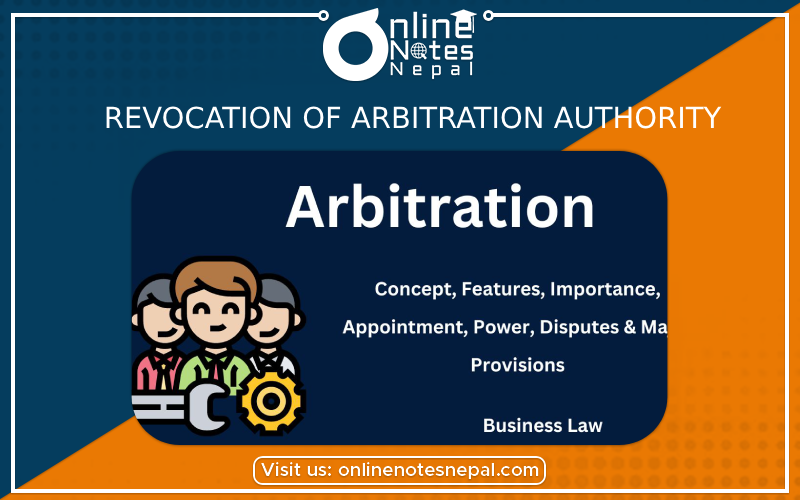Published by: Anu Poudeli
Published date: 06 Aug 2023

The act of terminating or removing the power and jurisdiction granted to an arbitrator or arbitration panel to decide disputes between parties is referred to as revocation of arbitration authority. Arbitration is a private and alternative conflict resolution procedure in which parties agree to submit their disagreements to an unbiased third party, the arbitrator, for a binding decision instead of going to court.
There are various reasons why a party may attempt to withdraw the arbitrator's authority:
1.Mutual Agreement: The parties to the arbitration may mutually agree to end the arbitration proceedings. This could happen if the parties reach an agreement on their own or select an other means of conflict resolution, such as negotiation or mediation.
2.Arbitrator Disqualification: If a party discovers that the arbitrator appointed has a conflict of interest or does not meet the agreed-upon qualifications, they may seek that the arbitrator's authority be revoked. This could happen if the arbitrator has a close personal or financial relationship with one of the parties, making it difficult for them to be impartial.
3.Misconduct by the Arbitrator: If the arbitrator participates in unethical behavior, bias, or any other type of misconduct that jeopardizes the integrity of the arbitration process, the aggrieved party may seek to withdraw the arbitrator's power.
4.Failure to Comply with Arbitration Agreement: If one of the parties fails to meet their obligations under the arbitration agreement, such as failing to pay the required fees or declining to participate in the arbitration, the case will be dismissed.
5.Contesting the Validity of the Arbitration Agreement: A party may sue in court to question the validity or enforceability of the underlying arbitration agreement, aiming to nullify the agreement and withdraw the arbitrator's jurisdiction.
It is critical to highlight that if the arbitration authority is removed, the parties must decide on an alternative method of resolving their dispute, such as court proceedings. Furthermore, based on the applicable laws, the wording of the arbitration agreement, and the institutional norms controlling the arbitration process, the particular procedures for withdrawing arbitral authority may differ.
If you are faced with the revocation of arbitration rights, it is critical that you speak with a knowledgeable attorney or legal expert experienced in arbitration and conflict resolution.